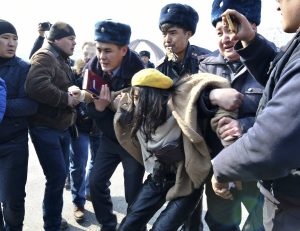On March 8, 2020 — coinciding with International Women’s Day — masked men, some donning the iconic Kyrgyz kalpak, attacked a group of activists who had gathered in Bishkek for a demonstration to call attention to violence against woman in Kyrgyzstan. The police then rounded up the activists, mostly women, and shoved them into police vans.
The absurdity continued with a Bishkek court ruling in June that the activists were guilty of holding an “unauthorized spontaneous meeting” and issuing 11 female activists a 3,000 Kyrgyz som fine each. Meanwhile, it remains unclear precisely who the group of men that attacked the march were. Though some were also detained and fined, most ran away and the police did not give chase.
This week Kyrgyzstan’s Supreme Court ruled that the crackdown by police on the Women’s Day march was illegal. As RFE/RL reports, the court’s decision cancels the rulings of two lower courts that had upheld the arrest of the 11 activists in March. The activists plan to appeal the fines, too.
There had been some confusion before the scheduled Women’s Day march. As Eurasianet reported at the time, a Bishkek court ruled on March 5 to cancel the protests to prevent the spread of the coronavirus. Kyrgyzstan did not record its first case until mid-March, but was anxiously and haphazardly banning and then unbanning various kinds of events and gatherings in early March. The next day, the court appeared to reverse itself. The day after the disrupted march, the Bishkek city prosecutor’s office, Human Rights Watch reported, “found the restrictions on the right to ‘rallies, marches and other events’ to be unlawful.”
While the Supreme Court’s decision establishes that the police were in the wrong in cracking down on the march, many questions remain about why it was the peaceful protesters and not the masked men with sticks that were chased down.
As Colleen Wood lamented in late March, with the coming of COVID-19 officially to the region, “it’ll be hard to focus on much besides the looming public health crisis and economic devastation.” That sentiment remains valid, with political turmoil now heaped upon the ongoing pandemic and economic crisis in Kyrgyzstan to obscure discussions about freedom of speech, women’s rights, and other issues.
Violence against women has been and remains a serious problem in Kyrgyzstan, as it is elsewhere. Dramatic incidents that break into the public sphere — like the video of a husband torturing his wife that surfaced this summer or the murder of Burulai Turdaaly Kyzy in 2018 — belie the extent of the problem and its true roots.

































